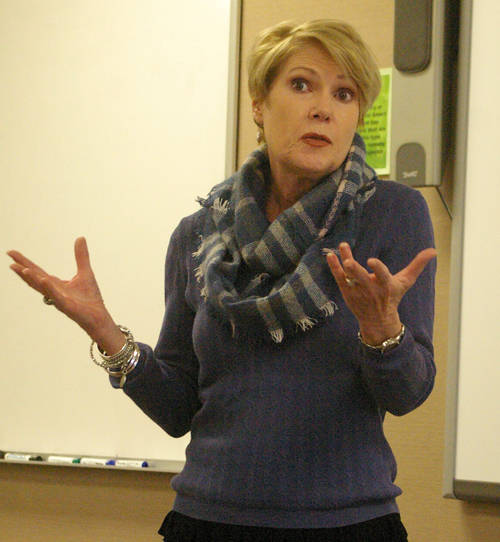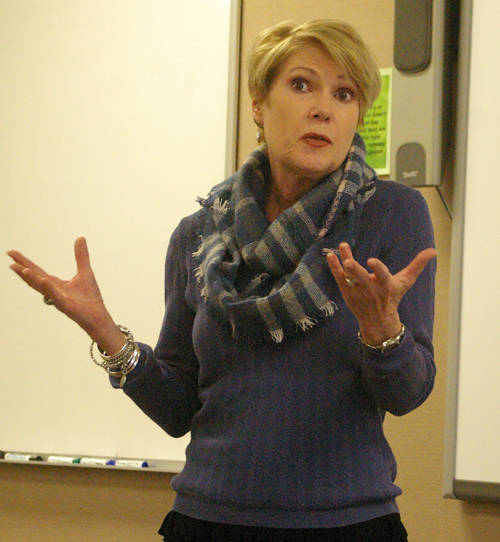

CELINA – Water quality and pollution in Grand Lake St. Marys dominated a nearly hour long discussion in Celina with Ohio Department of Agriculture Director Dorothy Pelanda.
The Darke Soil & Water Conservation District and Mercer Soil & Water Conservation District co-hosted Monday’s meet and greet with Pelanda, who was appointed as director on Jan. 10 by Gov. Mike DeWine. Pelanda, the first woman to lead the Ohio Department of Agriculture, spent most of her time answering questions from the approximately 50 people in attendance – most of which focused on Grand Lake St. Marys.
“We saw here when there was no control put on agribusiness in this area on pollution of Grand Lake St. Marys, we lost lots of businesses. We’ve lost jobs,” Kate Anderson, president and director of Guardians of the Grand Lake St. Marys, said. “The Ohio State University study shows that homeowners in a certain mile area radius of the lake have lost over $500 million in property values.”
Buzz Goodwin, who owns eight businesses around Grand Lake including campgrounds and marinas, said Grand Lake was thriving 10 or 15 years ago but has seen people leave the lake over pollution and toxic algae concerns. The region’s tourism revenue has fallen from $200 million a year to $120 million a year over the past decade, he said.
“To lose $1 billion of money that could have been revenue taxed to come back to the community, to come back to the state, because other administrations – not Mr. DeWine’s – pushed this problem under the rug,” Goodwin said. “They just walked away, let Mercer County do what they’re doing. That’s fine. They just walked away. Well now we’ve polluted Lake Erie. Now we’ve polluted all the streams that run to Lake Erie. Now we’re polluting the Ohio River. And we’ve lost a billion dollars doing it that could have been taxed and created industry if we’d just cleaned up the mess back two or three governor administrations ago.”
Pelanda, who still lives on the family farm she grew up on in Union County, said she understands the importance of being good stewards of land and water from personal experience.
“Growing up on that farm, which was a grain operating farm, the issues of soil and water quality, wildlife management and invasive species management were things that we lived every day because in order to quality for various programs my father and mother wanted to be in we had to learn how to be good stewards of our land,” she said. “We have a 10-acre pond and a 4-acre pond on various parts of our farm, and in the ’70s we began to see these beautiful ponds that we swam and fished in turn into black lagoons. And so we learned what was causing that was all the runoff from our beautiful grain fields and we learned how to be good stewards of both our water and our soil.”
Similar to the runoff that polluted the Pelanda ponds, Goodwin cited studies that attributed 85 percent of Grand Lake St. Marys’ pollution to runoff from farms. He encouraged Pelanda and DeWine to make a commitment to finding solutions to improve the water quality.
“We’re not about pointing fingers at our neighbors,” Goodwin said. “Neighbors come in and buy pontoon boats from me. They camp at my campground. I’m not here to point fingers, but I do want a solution.
“We need help bringing (funds) to this area so we’re not the third most polluted lake in the country or the worst in the state of Ohio or affecting Lake Erie. Those monies are there. We’re a distressed watershed, and we just can’t continue to wait. Wait is not a good answer. It it wasn’t as bad maybe we could wait. But there’s funds out there for it. Let’s go ask. Let’s all together sit the room and develop the plan because nobody’s pointing fingers. We all need each other. We really do.”
Recently the voters of Toledo approved a Lake Erie Bill of Rights that seeks to add new protections for Lake Erie and allow people to sue farmers who contribute to the lake’s pollution. Farmers already have challenged the vote, and Pelanda said she expects the issue to be tied up in litigation for years.
“It’s certainly something that I want farmers to be aware of and to understand their rights, their defenses and their protections,” she said. “I would say to farmers that you really want to look into the benefits of soil testing, nutrient management plans and agricultural districts, not only for our own personal benefits but also to protect us against such claims.”
Jill Smith, the Ohio Farm Bureau’s s organization director for Auglaize, Logan, Mercer and Shelby counties, said officials have made strides in improving water quality at Grand Lake St. Marys, but long-term solutions are required.
“The efforts that have been made in the watershed have been commendable,” Smith said. “We have made great strides. We’re actually seeing results as we go forward. And I think we as the agriculture community and the soil and water district here and those that are working on this problem need to be commended for what they’re doing.”
Pelanda also said changes won’t happen overnight and that each watershed needs its own solutions based on the needs and desires of the communities.
“These issues are hard. They’re human relationship issues. They’re not just data issues. And it’s all about not pointing the finger at each other but working together. Everyone has an interest in water quality for this county,” she said. “We are all part of this together, and we need to come together to work together on these solutions.”
DeWine is committed to improving water quality in Ohio and at Grand Lake St. Marys in particular, Pelanda said.
“The best news is that we have a governor who is a farmer who called me yesterday through his administration and said ‘I want information about Grand Lake St. Marys.’ He was very specific in his questions,” she said. “He’s on it, he understands it, and he’s here to make a difference.”





